“Beware of rodents entering the house or other spaces and take adequate precautions”
New Delhi, November 29, 2018:
According to statistics, hantavirus pulmonary syndrome (HPS) has a mortality rate of about 40%. There are currently no treatments or vaccines available for this condition. First identified in 1993, hantaviruses cause severe and sometimes fatal respiratory infections and are known to infect lung cells. The first case of death reported in India due to this condition was that of a 12-year-old boy from Mumbai.
Hantavirus infection or HPS is a lung infection caused by viruses found in the saliva, urine, and droppings of rodents. The illness is rare but has a high morbidity and mortality rate. Rats are the commonest carrier of the virus as their urine or dung can be infected. The virus is also air-borne.
Speaking about this, Padma Shri Awardee, Dr KK Aggarwal, President, HCFI, said, “Hantavirus enter the human body through infected rodent bodily fluids. The virus can affect the heart, lungs and kidneys and reduces their function. It can also enter the bloodstream where it further continues to spread, replicate, and cause further organ damage. The body attempts to fight the virus by creating inflammation. All of this can lead to intense bodily damage. In the lungs, leaky blood vessels cause flooding in the air sacs, and therefore breathing difficulty. When the virus infects the heart, the damage reduces its ability to pump blood around the body. Failure of the heart to pump and leaky vessels with reduction in blood flow causes very low blood pressure (“shock”), and oxygen is not available to all the cells of the body. This can rapidly lead to failure of most or all the organs and eventually to death.”
The early symptoms of HPS include fatigue, fever and muscle aches, followed after a week or so by coughing and shortness of breath.
Adding further, Dr Aggarwal, who is also the Group Editor-in-Chief of IJCP, said, “There is no cure for HPS and only supportive treatment can be provided. This includes oxygen therapy, fluid replacement, and use of medications to support blood pressure. Given that those affected by HPS have the risk of rapid respiratory deterioration, patients suspected with this condition should immediately be transported to a hospital for intensive care monitoring.”
Some tips from HCFI
- Close any holes or cracks in the house or work environment through which rodents may gain entry. It is important to note that they can come in even through a small opening.
- Identify potential nesting sites, and clean up debris, clear bushes, and trap rodents to remove them.
- Open and aerate any chronically closed rodent-infested spaces well before entering them.
- Heavily infested areas should be brought to the attention of the relevant authorities prior to cleaning campaigns.
- Ensure that you keep your surroundings clean and sanitized.







